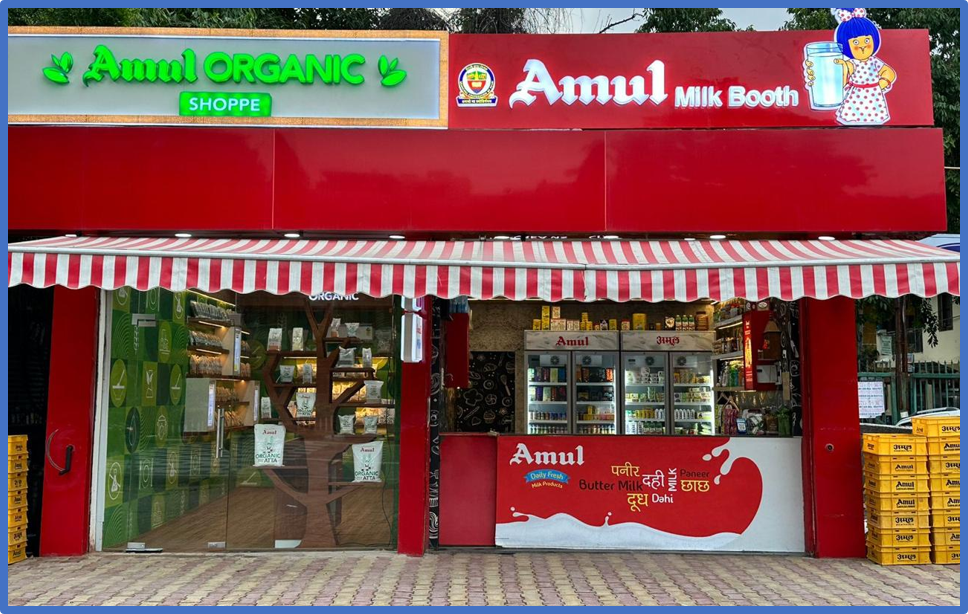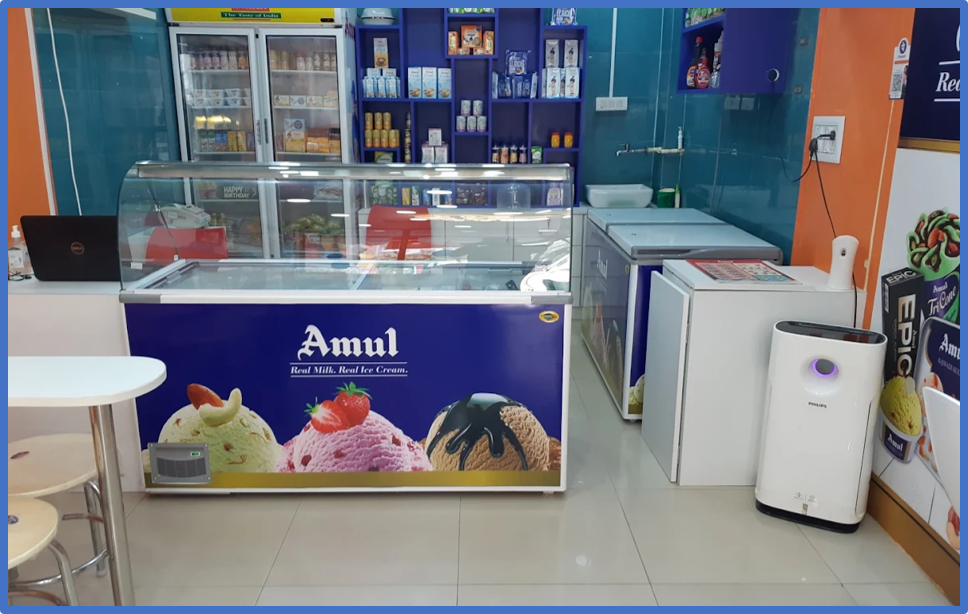Starting an Amul Parlour Franchise can be a lucrative business opportunity, especially for those looking to invest in a well-established brand. This blog will cover everything you need to know about the Amul franchise, including costs, profit margins, monthly income, and the application process.
History of Amul Parlour Franchise

Amul’s journey began on December 19, 1946, in Anand, Gujarat, as a response to the exploitation of small dairy farmers by traders and agents. At the time, milk prices were arbitrarily determined, giving Polson an effective monopoly in milk collection from Kaira and its subsequent supply to Mumbai. Frustrated with these unfair trade practices, the farmers of Kaira, led by Tribhuvandas Patel, approached Sardar Vallabhbhai Patel, who advised them to form a cooperative. This cooperative would allow them to directly supply their milk to the Bombay Milk Scheme instead of working for Polson.
Following a meeting in Chaklasi, the farmers formed the cooperative and resolved not to provide Polson with any more milk. Milk collection was decentralized, as most producers were marginal farmers who could deliver, at most, 1–2 litres of milk per day. By June 1948, the Kaira District Co-operative Milk Producers Union Ltd. (KDCMPUL) had started pasteurizing milk for the Bombay Milk Scheme.
The cooperative was further developed through the efforts of Verghese Kurien and H. M. Dalaya. Dalaya’s innovation of making skim milk powder from buffalo milk was a technological breakthrough that revolutionized India’s organized dairy industry. With Kurien’s help, the process was expanded on a commercial scale, leading to the first modern dairy cooperative at Anand.
The success of the cooperative model soon spread to other districts in Gujarat, following the approach sometimes described as the Anand pattern. In 1970, the cooperative spearheaded the “White Revolution” of India. To combine forces and expand the market while saving on advertising and avoiding competition against each other, the Gujarat Co-operative Milk Marketing Federation Ltd. (GCMMF) was set up in 1973. The Kaira Union, which had the brand name Amul since 1955, transferred it to GCMMF. Technological developments at Amul have subsequently spread to other parts of India.
In 1999, Amul was awarded the “Best of All” Rajiv Gandhi National Quality Award.
Investment Required for Amul Parlour Franchise

Amul Parlours are exclusive outlets that store and sell the entire range of Amul products. These outlets are typically spread over 100 to 300 sq ft in high-footfall areas such as markets, educational institutes, hospitals, railway stations, bus stations, and municipal corporation gardens.
The franchisee must have a prebuilt shop/space in a good location, either owned or rented. The franchisee is expected to bear the entire cost of setting up the store, excluding property cost, which ranges from Rs. 1.50 lacs to Rs. 6.00 lacs depending on the format.
Investment Breakdown:
- Total Investment: Rs. 1.50 lacs to Rs. 6.00 lacs
- Refundable Brand Security: Rs. 25,000 to Rs. 50,000
- Renovation: Rs. 1,00,000 to Rs. 4,00,000
- Equipment: Rs. 70,000 to Rs. 1,50,000
Additional Benefits:
- Exclusive consumer offers
- Store inauguration supports
- Equipment purchase supports
- Free brand signage
Profit Margin and Profitability Analysis

The franchisee will avail retail margins, which vary from product to product. The franchisee does not need to pay any royalty or share any revenue with Amul.
Estimated Profit Margins:
- Pouch Milk: 2.5%
- Milk Products: 10%
- Ice Cream: 20%
- Recipe-based Ice Cream Scoops/Sundaes/Floats/Shakes/Baked Pizzas/Sandwiches/Cheese Slice Burger/Garlic Bread/Hot Chocolate Drink (Amul Pro): About 50%
- Pre-packed Ice Creams: 20%
Expected Monthly Sales Turnover: Rs. 5 lac to Rs. 10 lac, depending on the location.
Amul Parlour Franchise Formats

Amul offers different formats for its parlours, each with specific features and investment requirements.
Formats:
- Amul Preferred Outlet/Amul Railway Parlour/Amul Kiosk
- Shop Size: 100 – 150 sq ft
- Investment: Rs. 2.00 lacs (approx.)
- ROI: Pouch Milk – 2.5%, Milk Products – 10%, Ice Cream – 20%
- Amul Ice-Cream Scooping Parlour
- Shop Size: >300 sq ft
- Investment: Rs. 6.00 lacs (approx.)
- ROI: About 50% on recipe-based ice cream scoops/sundaes/floats/shakes/baked pizzas/sandwiches/cheese slice burger/garlic bread/hot chocolate drink (Amul Pro). For pre-packed ice creams, the margin would be 20%.
Requirements for Amul Parlour Franchise

To open an Amul Parlour, the franchisee must meet certain requirements, including financial, personal, legal, and location criteria.
Requirements:
- Financial: Investment of Rs. 1.50 lacs to Rs. 6.00 lacs
- Personal Qualities: Good business acumen
- Legal Compliance: Adherence to local regulations
- Location Criteria: High-footfall areas such as markets, educational institutes, hospitals, railway stations, bus stations, and municipal corporation gardens
Challenges Involved in Amul Parlour Franchise
Starting an Amul Parlour Franchise can be a lucrative opportunity, but it comes with its own set of challenges, especially for those from a middle-class background. Here are some of the key challenges:
- High Initial Investment:
- The initial investment required to set up an Amul Parlour can range from Rs. 1.50 lacs to Rs. 6.00 lacs. This can be a significant amount for middle-class individuals, making it essential to secure adequate funding or savings before starting the franchise.
- Securing a Prime Location:
- Finding a suitable location with high footfall is crucial for the success of the parlour. Prime locations such as markets, educational institutes, hospitals, and transportation hubs are often in high demand and can be expensive to rent or purchase.
- Competition:
- In urban areas, there may be stiff competition from other established brands and local dairy shops. In rural areas, the preference for direct cow milk over packet milk can limit the market for Amul products.
- Operational Costs:
- Recurring expenses such as employee salaries, electricity charges, and shop rentals need to be managed efficiently to ensure profitability. These costs can add up and impact the overall margins.
- Market Penetration in Rural Areas:
- In villages, the consumption of packet milk is relatively low as people prefer fresh cow milk. This can pose a challenge in achieving the expected sales turnover and profitability in rural locations.
How to Apply for Amul Parlour Franchise
To apply for an Amul Parlour Franchise, follow these steps:
- Visit the Official Site: Go to the Amul website to understand the requirements and start the application process.
- Navigate to the Amul Parlour Section: At the bottom of the Amul webpage, click on the “Amul Parlour” tab and press continue. This will open a page with all the necessary information.
- Access the Online Form: The page will have a link to the “Online form for Amul parlour.” Click on this link to open the application form.
- Fill in the Details: Complete the form with accurate details, including your contact information.
- Confirmation Email: After submitting the form, you will receive a confirmation email with further instructions. An Amul representative will contact you for an enquiry to start the franchise business.
- Contact Customer Care: For additional information or assistance with the application process, you can contact Amul customer care.
Conclusion
Starting an Amul Parlour Franchise offers a promising business opportunity with the backing of a well-established brand. However, it is essential to carefully consider the initial investment, location, and market dynamics before taking the plunge. For middle-class entrepreneurs, securing adequate funding and finding a prime location are critical steps. Additionally, understanding the local market preferences, especially in rural areas, can help in strategizing the business effectively.
Despite the challenges, the support provided by Amul in terms of consumer offers, store inauguration, and equipment purchase can significantly aid in setting up and running the franchise successfully. Aspiring entrepreneurs should weigh the pros and cons, conduct thorough research, and take informed decisions to make the most of this opportunity.
Contact Details:
- Email: retail@amul.coop
- Phone: 022-68526666
Disclaimer: The information provided in this blog is for general informational purposes only and does not constitute professional advice. The author and publisher make no representations or warranties regarding the accuracy, completeness, or reliability of the content. Business decisions should be made after conducting thorough research and consulting with qualified professionals. Mention of specific companies, products, or services does not imply endorsement. Financial estimates are based on available data and are subject to change. The author and publisher are not responsible for any actions taken based on the content of this blog. Readers are encouraged to independently verify information before making any business or financial decisions.
You may also like: